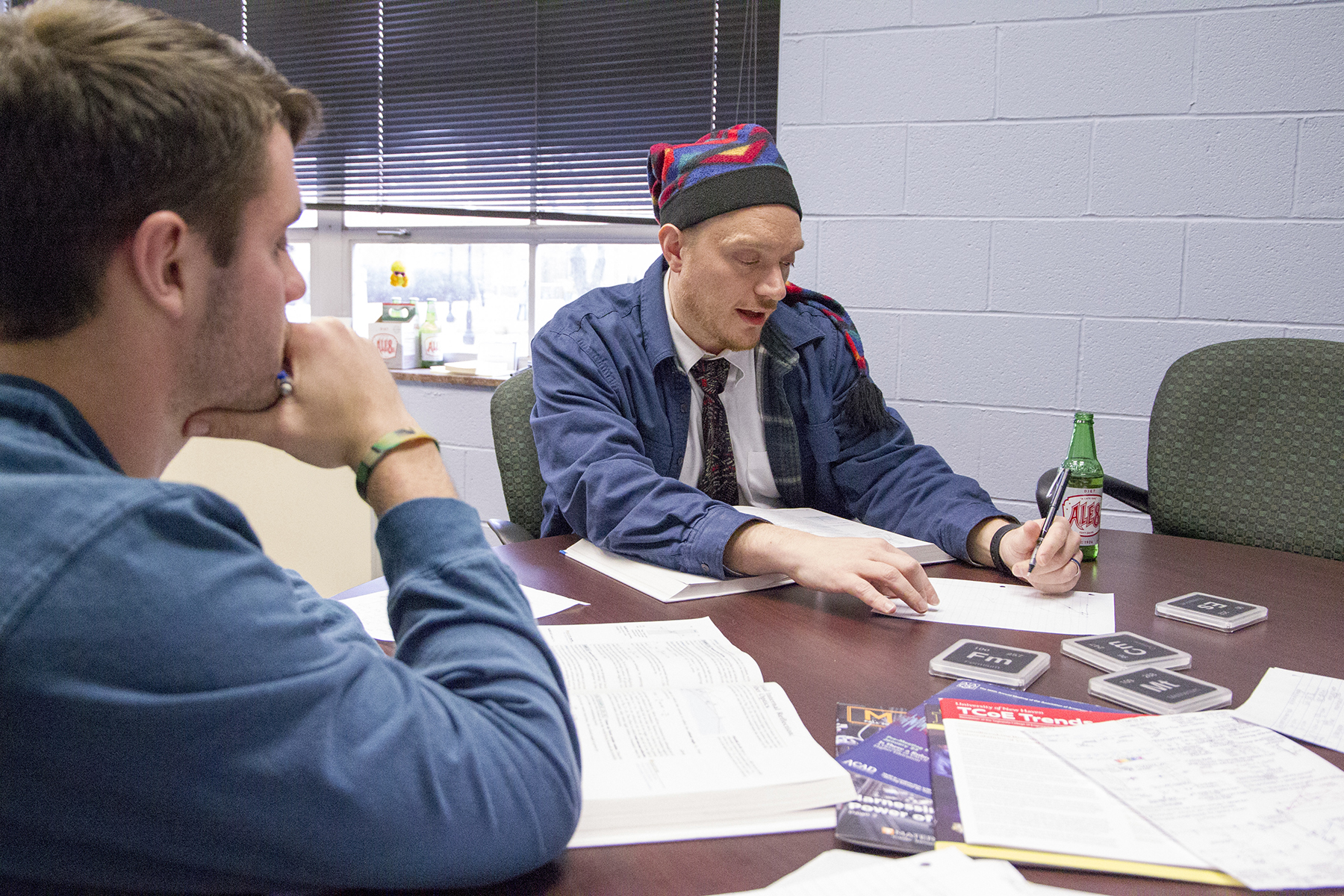So you want to be a nuclear physicist …: The title of the textbook taunts a curious seventh-grade boy from Mouthcard, Kentucky.
Unbeknownst to Shadow Robinson, at the time, this book would change his life forever.
“I don’t remember not having an interest in science,” says the theoretical nuclear physicist and dean of Engineering and Natural Sciences at UTM. “I checked [the book] out and read it, and it turned out that the answer was yes! This is what I want to do.”
Because of the influence of one book, Robinson began learning as much math and science as he possibly could to achieve his dream of becoming a physicist.
His ambitions and intelligence when he was only in eighth grade set him on a fast-track through his high school and college education. Colleges, including his alma mater, the University of Kentucky, began contacting his parents seeking admission for Robinson when he was just 14 because of his unusually high score on the ACT.
Robinson began taking summer courses at UK between his freshman and sophomore years of high school, which included Astronomy and Calculus 1.
By his junior year in high school, Robinson had been accepted to the California Institute of Technology (CalTech) and Massachusetts Institute of Technology (MIT), along with many other prestigious universities, without a high school diploma.
Robinson finally decided to attend the University of Kentucky after being offered a full-ride scholarship. Not only did he earn bachelor’s degrees in Math, Physics and Astronomy, but he also taught while earning those degrees. Robinson then earned a Ph.D. in Theoretical Nuclear Physics at Rutgers University in New Jersey.
Technically, Robinson did not graduate from high school. By the time his high school graduation occurred, he was already a junior in college.
Robinson now specializes in low-energy nuclear shell model calculations.
It’s “the feeling of not knowing something and trying to figure it out” that helped Robinson thrive during his college education, and what continues to push him to this day.
“One of the greatest moments of my life professionally was when I was in grad school going home, knowing something I had figured out that day that no other human being had known,” Robinson said.
“I had a cat [Doofy] at the time that normally I would talk to when I got home because I just like to hear my voice, and I would tell the cat what I had done that day. That particular night I came home and I said, ‘Sorry I can’t tell you tonight, I’m taking this one with me’ because if I died, I wanted to take it with me. I slept one night with no human being, no creature knowing this one particular thing I knew. That’s just thrilling.”
Robinson later wrote a research paper about his “one particular thing” – a discovery of patterns and relationships within 6-j symbols, specifically one set where he proved the outcome was always zero.
“That [discovery] required a high five of myself after doing a victory lap in the lab,” Robinson said.
Robinson finds himself enthralled with discovering how and why things work the way they do, which led to his career in theoretical nuclear physics.
“I think there is something kind of eloquent about it [theoretical nuclear physics] from a human perspective … that that’s something that humans do. … I don’t think animals [aside from Doofy] are really that curious about how the universe works and why things do the things they do,” Robinson said, laughing.
“Being able to pull that together is a pretty staggering accomplishment for [this] species.”
Physics provides the opportunity to define how the entire universe operates, given the right equations and formulas, Robinson explained. All of light, electromagnetism and electricity are all explained through Maxwell’s Equations; just four equations. Newton’s Law of Gravitation defines how the universe itself coexists and cooperates. The development of physics, just like these two examples, has led to the basis of humans’ understanding of the universe.
The first time Robinson derived Maxwell’s Equations himself, he couldn’t look around the classroom to see if anyone else had done it as well because, he said, he was crying over its eloquence.
“It’s a staggering accomplishment and if I can play a small part of that, I’ll be thrilled,” Robinson said. “I want to do that.”
While So you want to be a nuclear physicist … is responsible for guiding his professional career, it was a different, more adventurous tale that influenced his personal being.
The famous and beloved The Lord of the Rings by J.R.R. Tolkien is the series that sparked Robinson’s love for creative writing.
After reading The Iliad and The Odyssey at UK, Robinson’s English class was challenged with the debate of which work was better. Being the youngest in his class, at only 16, did not keep Robinson from being outspoken about his opinions of the epics, but he found he was the only one who preferred The Iliad. Interested in his developed understanding of the two stories, Robinson’s professor became interested in what other books and philosophies consumed this teenager.
Robinson’s appreciation for the classics was vast, but ironically did not yet include Tolkien. After his professor encouraged him to read The Lord of the Rings and even gave him her copy of the series, Robinson became obsessed with the journeys and challenges the hobbits faced. Because of one professor’s influence, Robinson found himself on the adventure of a lifetime that began in a hole in a hill.
Robinson has now read the entire series at least once a year since he was 17, in multiple formats, and even with The Silmarillion twice. Every time he reads the series, he learns something new – if not about the books, then about himself.
“I think what really resonates most deeply with me right now is that we are all part of an enormous and ongoing story, that started long before we got here, and will keep going long after we have played our part, or as Gandalf put it … ‘All we have to decide is what to do with the time that is given us.’”
As a result of his search for the next great literary adventure after Tolkien, Robinson took it upon himself to write his own stories.
“At some point, I accepted that while I still hope to live forever, that Tolkien did not, and there will be no more big awesome stories like that. Tolkien was gone, so I thought I’d make one,” Robinson said.
Every year since 2005, Robinson has participated in the National Novel Writing Month (NaNoWriMo) challenge, which involves writing a 50,000-word novel during the month of November. He has now written 14 novels and plans to continue the series until he finishes his 20th book. Robinson has also self-published a novella, The Forgotten Man, which he wrote when he was 17, and is in the process of writing an epic dedicated to a friend of his who died.
Through his writing, he has created an entire universe of his own, filled with magic, adventures, dragons, family and the search for justice. However, he has no idea how the series will end.
“That’s the great thing about writing a story so fast is you don’t quite structure them, it just happens to you,” Robinson said.
Now that Robinson is the dean of Engineering and Natural Sciences, he does not have as much time as he would like to dedicate himself to his writing, but he did finish his latest novel this past November before the competition was over. His appreciation for creative writing translates into his physics career, as he keeps an open mind about the structure of the world.
In all of his years of studying and teaching physics, Robinson believes the most defining trait of how everything works is its elegance and cohesiveness.
“No matter how strangely complicated things are, if you give yourself and others, often others much smarter than I, time, we’ll figure out that there’s a way to explain it that makes sense and almost always has a certain elegance and beauty to it,” he said.
While still studying physics himself, Robinson loves the opportunities that teaching physics gives to students and the research field. “The only thing I enjoyed more than figuring out how the universe worked was sharing it with other people.”
In his administrative role at UTM, he is now able to help others make their contribution to the study of physics.
“What I really enjoy is doing what I can to help other people do their side,” Robinson said. Whether that is doing paperwork or finding more funds to help students do extra research in the labs, Robinson is willing to help students experience their education to the fullest.
When making his decision to teach at UTM, Robinson weighed many different factors, but focused on his No. 1 goal: how much of a difference he could actually make – not just on the campus, but for the students as well.
UTM reminds him of the universities his parents and high school classmates attended as first-generation students, he said, and the impact it had on later generations, such as himself.
“A lot of the students at a place like Harvard, they will get a lot out of the education, but many of them are going to be fine [regardless of the professor]. How big of an impact are you really going to be having?” Robinson asked.
“Whereas, when I get excited about education, I go back and I think about my parents … who had a very different experience than anyone else in their families. I think, ‘Where can I help people have the experience and support that many of my high school classmates [and parents] had?'”
Robinson said UTM is the pinnacle of this dream and he hopes to make a lasting impact on the university that surpasses his time as an educator and mentor.
He also hopes that students can tell that he is trying the best he can to ensure their growth, not only in college but also in life.
“I really want what’s going to be the best for them in the long run. To me, the goal isn’t just to get through a class; the goal isn’t just to get through a degree program. The goal is to be able to live the life you want and hope to have.”
While Robinson’s job as dean requires him to make difficult decisions regarding the college and its students, he said he hopes the actions he takes today will have a positive impact on generations of Skyhawks to come.
“The opportunities to change lives … there’s a lot of [those] here.”
Robinson works one-on-one with senior Brady Brown to make sure the magic of physics is still alive. |Pacer Photo/ Sarah Knapp


